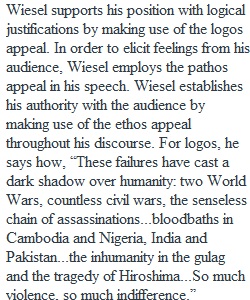


Q 1. - Practice • Read "The Perils of Indifference," Download "The Perils of Indifference,"by Elie Wiesel, and find 5 classical appeals (there are only 3, but point out 5 instances of them) that he uses in the speech. 2. - Post • Share the 5 classical appeals you found in the speech. For each classical appeal you share, be sure to indicate the line or passage in quotation marks (if it's a long passage, you only need to put the first line or so), AND also explain why it qualifies as the classical appeal you indicate. • Post your answers to the discussion board (note: you will not see anyone else's posts until you post to the discussion board AND once you post, you will not be able to edit, so be careful about posting until you are ready to do so). • Add a thoughtful comment (not just "agreed" or "yes") about another student's discussion board post about the key idea that was selected (while responding, be sure to be respectful and courteous). Once you have completed these steps, you are finished with the discussion board assignment. This assignment is due by 11:59 p.m., Sunday, 1/15.
View Related Questions